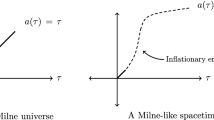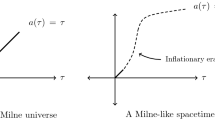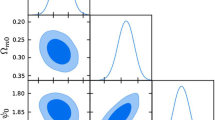Abstract
Confronted with microwave background observations by WMAP and with consternating supernova locations in the magnitude–redshift diagram modern cosmology feels enforced to call for cosmic vacuum energy as a necessary cosmological ingredient. Most often this vacuum energy is associated with Einstein’s cosmological constant Λ or with so-called “dark energy”. A positive value of Λ describes an inflationary action on cosmic dynamics which in view of recent cosmological data appears as an absolute need. In this article, however, we question the hypothesis of a constant vacuum energy density since not justifiable on physical grounds. Instead we show that gravitational binding energy of cosmic matter, connected with ongoing structure formation during cosmic expansion, acts similar to vacuum energy, since it reduces the effective gravitating proper mass density. Thus one may be encouraged to believe that actions of cosmic vacuum energy and gravitational binding energy concerning their cosmological effects are closely related to each other, perhaps in some respects even have identical phenomenologies.
Based on results presented in this article we propose that the generally wanted action of vacuum energy on cosmic spacetime dynamics inevitably leads to a decay of vacuum energy density. Connected with this decay is a decrease of cosmic binding energy and the generation of new effective gravitating mass in the universe. If this all is adequately taken into account by the energy-momentum tensor of the GR field equations, one is then led to non-standard cosmologies which for the first time can guarantee the conservation of the total energy both in static and expanding universes.
We describe the structuring of cosmic matter by a change in time of the 2-point correlation-function. We do show here that cosmic structure formation drives accelerated cosmic expansion and feigns the action of vacuum energy density.


Similar content being viewed by others
References
Bahcall, N.A., Chokshi, A.: Astrophys. J. Lett. 385, 33 (1992). doi:10.1086/186271
Barrow, J.D.: The Book of Nothing: Vacuum, Voids and the Latest Ideas About the Origin of the Universe (2000)
Bennett, C.L., Hill, R.S., Hinshaw, G., Nolta, M.R., Odegard, N., Page, L., Spergel, D.N., Weiland, J.L., Wright, E.L., Halpern, M., Jarosik, N., Kogut, A., Limon, M., Meyer, S.S., Tucker, G.S., Wollack, E.: Astrophys. J. Suppl. Ser. 148, 97 (2003). arXiv:astro-ph/0302208, doi:10.1086/377252
Blome, H.J., Hoell, J., Priester, W.: Kosmologie, vol. 8, p. 439 (2002)
Carroll, S.M., Press, W.H., Turner, E.L.: Annu. Rev. Astron. Astrophys. 30, 499 (1992). doi:10.1146/annurev.aa.30.090192.002435
Dirac, P.A.M.: Nature 139, 323 (1937). doi:10.1038/139323a0
Dirac, P.A.M.: R. Soc. Lond. Proc. Ser. A 165, 199 (1938)
Einstein, A.: Sitzungsberichte der Königlich Preußischen Akademie der Wissenschaften (Berlin), Seite 142–152, 142 (1917)
Einstein, A., Straus, E.G.: Rev. Mod. Phys. 17, 120 (1945). doi:10.1103/RevModPhys.17.120
Fahr, H.J.: Phil. Nat. Sci. 17, 48 (1989)
Fahr, H.J.: Phil. Nat. Sci. 33, 339 (2004a)
Fahr, H.J.: Phil. Nat. Sci. 33, 339 (2004b)
Fahr, H.J., Heyl, M.: Astron. Nachr. 328, 192 (2007a). arXiv:astro-ph/0606048. doi:10.1002/asna.200610714
Fahr, H., Heyl, M.: Naturwissenschaften 94, 709 (2007b). doi:10.1007/s00114-007-0235-1
Fahr, H.J., Siewert, M.: Naturwissenschaften 95, 413 (2008). doi:10.1007/s00114-007-0340-1
Fahr, H.J., Sokaliwska, M.: Revised Concepts for Cosmic Vacuum Energy and Binding Energy: Innovative Cosmology, p. 95 (2011). http://www.intechopen.com/articles/show/title/revised-concepts-for-cosmic-vacuum-energy-and-binding-energy-innovative-cosmology
Faus, A.A.: Small-bang Versus Big-bang Cosmology, p. 385 (2011)
Fischer, E.: Astrophys. Space Sci. 207, 203 (1993). doi:10.1007/BF00627240
Goenner, H.F.M.: In: Barbour, J.B., Pfister, H. (eds.) Mach’s Principle: From Newton’s Bucket to Quantum Gravity, p. 442 (1995)
Goenner, H.F.M., Einführung in die Spezielle und Allgemeine Realativitätstheorie, pp. 430–431. Spektrum Akademisher, Heidelberg (1996)
Hajdukovic, D.S.: Astrophys. Space Sci. 334, 215 (2011). arXiv:1106.0847. doi:10.1007/s10509-011-0744-4
Hoyle, F.: Mon. Not. R. Astron. Soc. 108, 372 (1948)
Lamoreaux, S.K.: arXiv:1007.4276 (2010)
Overduin, J.M., Fahr, H.J.: Found. Phys. Lett. 16(2), 119 (2003)
Peebles, P.J., Ratra, B.: Rev. Mod. Phys. 75, 559 (2003). arXiv:astro-ph/0207347, doi:10.1103/RevModPhys.75.559
Streeruwitz, E.: Phys. Rev. D, Part. Fields 11, 3378 (1975). doi:10.1103/PhysRevD.11.3378
Wesson, P.S., Leon, J.P.D., Liu, H., Mashhoon, B., Kalligas, D., Everitt, C.W.F., Billyard, A., Lim, P., Overduin, J.: Int. J. Mod. Phys. A 11, 3247 (1996). doi:10.1142/S0217751X96001553
Wiltshire, D.L.: New J. Phys. 9, 377 (2007). arXiv:gr-qc/0702082, doi:10.1088/1367-2630/9/10/377
Zeldovich, I.B.: Sov. Phys. Usp. 133, 479 (1981)
Author information
Authors and Affiliations
Corresponding author
Rights and permissions
About this article
Cite this article
Fahr, HJ., Sokaliwska, M. The influence of gravitational binding energy on cosmic expansion dynamics: new perspectives for cosmology. Astrophys Space Sci 339, 379–387 (2012). https://doi.org/10.1007/s10509-012-1002-0
Received:
Accepted:
Published:
Issue Date:
DOI: https://doi.org/10.1007/s10509-012-1002-0




